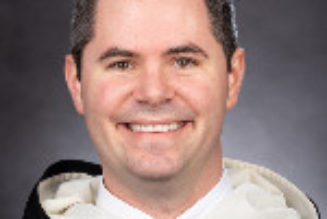By Dr. Jeff Mirus ( bio – articles – email ) | Dec 06, 2022
Human sexual depravity apparently knows no limits. In the latest effort to break down all barriers to a distorted self-realization of the people, by the people and for the people, a Dean of Trinity College (Cambridge) has defended the speculation of a junior research fellow who displayed photographs of the wounds of Christ and argued that one of the wounds was vaginal in character and suggested that Christ was transgendered: This at an evensong service in the college chapel. I actually hate to mention such a revolting assertion and its defense, which reveals only how far people will go when they are in flight from reality.
But this incident does reveal how determined our modern secular culture is to assert the control of sheer personal desire over being, at least as long as the desires in question are destructive of both our human nature and, consequently, of our understanding of and relationship with God. For transgenderism simply extends the litany of the confused sexual desires which afflict our fallen nature, and which must be reshaped and re-ordered through a combination of respect for reality, self-discipline, grace, and human growth—including spiritual growth. The Trinity College incident simply demonstrates once again the temptation to tear down both supernatural and natural reality in a perpetual act of self-justification. For as Our Lord warned: Those who do evil hate the light.
We should perhaps meditate once again on the deep spiritual, psychological and social reality alluded to in St. John’s Gospel:
For God so loved the world that he gave his only Son, that whoever believes in him should not perish but have eternal life. For God sent the Son into the world, not to condemn the world, but that the world might be saved through him. He who believes in him is not condemned; he who does not believe is condemned already, because he has not believed in the name of the only Son of God. And this is the judgment, that the light has come into the world, and men loved darkness rather than light, because their deeds were evil. For every one who does evil hates the light, and does not come to the light, lest his deeds should be exposed. But he who does what is true comes to the light, that it may be clearly seen that his deeds have been wrought in God. [Jn 3: 16-21]
In the same manner a depraved culture is driven by its own horror of exposure to deny, despise and trample on the good, and on the Author of the good, Who is a witness against that culture and all who seek refuge within it.
Sexual Sin
Someone reminded me recently that many, especially young adults, seek in sexual license a happiness which is so far eluding them. This, of course, is true of every form of evil. The motivation for us in the moment is to satisfy some desire which, with little or no reflection, we assume will make us to be happier, or to feel better. A genuine confusion, of course, seriously mitigates guilt; and it is important that confusion be dispelled through sound instruction on human nature, on human desire, and specifically on the nature, purpose and fulfillment of human sexuality. We ought, after all, to help especially those who are young, who are confused, and who find themselves in an essentially depraved environment (e.g., typical college and university life) to see things more clearly and more positively, in order to more consciously find happiness by choosing the Good.
On the other hand, someone else reminded me again recently how seldom we hear at Mass some of the parts of Scripture which are particularly challenging to our culture today, and how seldom we hear instruction from the pulpit on the nature of sexual sin, the virtue of chastity, and the need to deliberately cultivate purity—and especially how seldom we hear that a number of currently popular sexual behaviors are seriously sinful, and also frighteningly reminiscent of the Greek and Roman pagan societies prior to the coming of Jesus Christ. I haven’t done a study to see if key texts on these problems have been omitted or reduced in the current lectionary, but I suspect most of us can verify that even if we sometimes hear preaching against some kinds of sin, we hear very little from the pulpit about the popular sexual sins—the very serious sins which our dominant culture triumphantly regards as completely permissible and sometimes even virtuous today.
This is an unpardonable oversight, as most of us must begin by accepting that Catholic teaching on human sexuality correctly identifies what is sinful and what is not in the matter of particular human acts. Today’s preachers are reluctant to preach specifically about sexual sin and the distortion of our sexual appetites, or even more broadly about the virtues of purity and chastity. Yet warnings against sexual sin are frequent in the New Testament. In most English translations, when the word “immorality” is used, it refers specifically to sexual sins (this generic translation in itself tends to dull our perception of the reality under discussion). It is helpful, after all, to realize that there are several decisive passages which place a heavy emphasis on sexual purity and the avoidance of sexual sin.
The absence of solid preaching and teaching on these matters is a serious matter. Growing into a sound spirituality and cultivating habitual virtue can take time, especially once we have fallen into bad habits, but the process is generally jump-started by pointed questions and clear instruction which challenge us to make a decision for or against Christ. St. Paul made this particularly clear in his letters to the various local churches he had a hand in establishing. For example, he wrote this to the Corinthians:
Do you not know that the unrighteous will not inherit the kingdom of God? Do not be deceived; neither the immoral, nor idolaters, nor adulterers, nor sexual perverts, nor thieves, nor the greedy, nor drunkards, nor revilers, nor robbers will inherit the kingdom of God. And such were some of you. But you were washed, you were sanctified, you were justified in the name of the Lord Jesus Christ and in the Spirit of our God…. The body is not meant for immorality, but for the Lord, and the Lord for the body. And God raised the Lord and will also raise us up by his power. Do you not know that your bodies are members of Christ? Shall I therefore take the members of Christ and make them members of a prostitute? Never! Do you not know that he who joins himself to a prostitute becomes one body with her? For, as it is written, “The two shall become one flesh.” But he who is united to the Lord becomes one spirit with him. Shun immorality. Every other sin which a man commits is outside the body; but the immoral man sins against his own body. Do you not know that your body is a temple of the Holy Spirit within you, which you have from God? You are not your own; you were bought with a price. So glorify God in your body. [1 Cor 6:9-20]
And Paul taught the same lesson to the Thessalonians:
Finally, brethren, we beseech and exhort you in the Lord Jesus, that as you learned from us how you ought to live and to please God, just as you are doing, you do so more and more. For you know what instructions we gave you through the Lord Jesus. For this is the will of God, your sanctification: that you abstain from unchastity; that each one of you know how to take a wife for himself in holiness and honor, not in the passion of lust like heathen who do not know God; that no man transgress, and wrong his brother in this matter, because the Lord is an avenger in all these things, as we solemnly forewarned you. For God has not called us for uncleanness, but in holiness. Therefore whoever disregards this, disregards not man but God, who gives his Holy Spirit to you. [1 Thes 4:1-8]
Finally, in his Second Letter to the Thessalonians, Paul links acceptance of Christ’s teachings to eternal salvation. Obviously, God does not hold us accountable for what we never had the opportunity to know, but we ought also to reflect more deeply on those things which, deep down, we really do know, except when we harden ourselves against the voice of conscience, preferring ridiculous worldly platitudes. Just as we ought not to despair at being lost owing to our own ignorance, neither should we be presumptuous, hiding behind our fallen reluctance to think clearly. Rather, we must strive for virtue, including that virtue which we ought to be able to discern even through a reflection on the very nature in which we were created.
In any case, consider this (hopefully alarming) passage:
This is evidence of the righteous judgment of God, that you may be made worthy of the kingdom of God, for which you are suffering—since indeed God deems it just to repay with affliction those who afflict you, and to grant rest with us to you who are afflicted, when the Lord Jesus is revealed from heaven with his mighty angels in flaming fire, inflicting vengeance upon those who do not know God and upon those who do not obey the gospel of our Lord Jesus. They shall suffer the punishment of eternal destruction and exclusion from the presence of the Lord and from the glory of his might, when he comes on that day to be glorified in his saints, and to be marveled at in all who have believed, because our testimony to you was believed. [2 Thes 1:5-10]
What am I saying?
The children who received the apparitions of Our Lady of Fatima saw a vision of huge numbers of people in hell, and heard from the Blessed Virgin Mary that the most common reason for this was sins of the flesh, sins against chastity and purity, sins against marriage. Nobody is required to accept private revelation, but the Church has repeatedly endorsed these particular apparitions, and this is partly because the words of Our Lady echo what we already know from Divine Revelation itself.
In a confused society, of course, mitigating circumstances can exist which reduce the guilt of those who fall into all the culturally-championed sins. My point is not that the Church should make it a standard pastoral practice to condemn sinners, for we are all sinners, including all the Church’s ministers. But it ought not to be too much to expect that the ministers of the Church will speak clearly about sin, and all the more clearly about those particular kinds of sin which are denied by the dominant culture in which we suffer so much deprivation of truth and so great a habitual obstruction of grace. It ought not to be too much to ask that the ministers of the Church along with all well-formed Catholics should speak clearly and decisively against especially the most prominent and frequent sins in our society, a society which is, after all, even commercially built largely upon impurity.
We live, in the last analysis, in an extremely exploitative culture. Some would argue that it increases the risk of the Church and of good Christians generally to speak the truth forthrightly. But Scripture has something to say about that, too. To the prophet Ezekiel, God said:
Son of man, I have made you a watchman for the house of Israel; whenever you hear a word from my mouth, you shall give them warning from me. If I say to the wicked, “You shall surely die,” and you give him no warning, nor speak to warn the wicked from his wicked way, in order to save his life, that wicked man shall die in his iniquity; but his blood I will require at your hand. But if you warn the wicked, and he does not turn from his wickedness, or from his wicked way, he shall die in his iniquity; but you will have saved your life. Again, if a righteous man turns from his righteousness and commits iniquity, and I lay a stumbling block before him, he shall die; because you have not warned him, he shall die for his sin, and his righteous deeds which he has done shall not be remembered; but his blood I will require at your hand. Nevertheless if you warn the righteous man not to sin, and he does not sin, he shall surely live, because he took warning; and you will have saved your life. [Ez 3:17-21]
Certainly we should remember that much is expected from those to whom much has been given, and St. James makes clear that this applies to our own knowledge and awareness of sin: “Whoever knows what is right to do and fails to do it, for him it is sin” (Jas 4:17). But James also notes this:
My brethren, if any one among you wanders from the truth and some one brings him back, let him know that whoever brings back a sinner from the error of his way will save his soul from death and will cover a multitude of sins. [Jas 5:19-20]
In any case, considering the great blessing of knowing God and coming to delight in His will, do we actually think it is better to leave people in ignorance of the truth? Is that what Catholic preachers should do? Is that how we should treat our own children? What I am saying is that this is not only utter nonsense but a deliberate denial of the mercy and goodness of God, as if people somehow have a “better chance” if they do not know Him! To the contrary, Christians are called always to act both for the glory of God and the salvation of souls. If that does not begin rather pointedly in the pulpit (and in Catholic education), when and where will it begin?
Sound Off! CatholicCulture.org supporters weigh in.
All comments are moderated. To lighten our editing burden, only current donors are allowed to Sound Off. If you are a current donor, log in to see the comment form; otherwise please support our work, and Sound Off!

There are no comments yet for this item.
Join Our Telegram Group : Salvation & Prosperity










